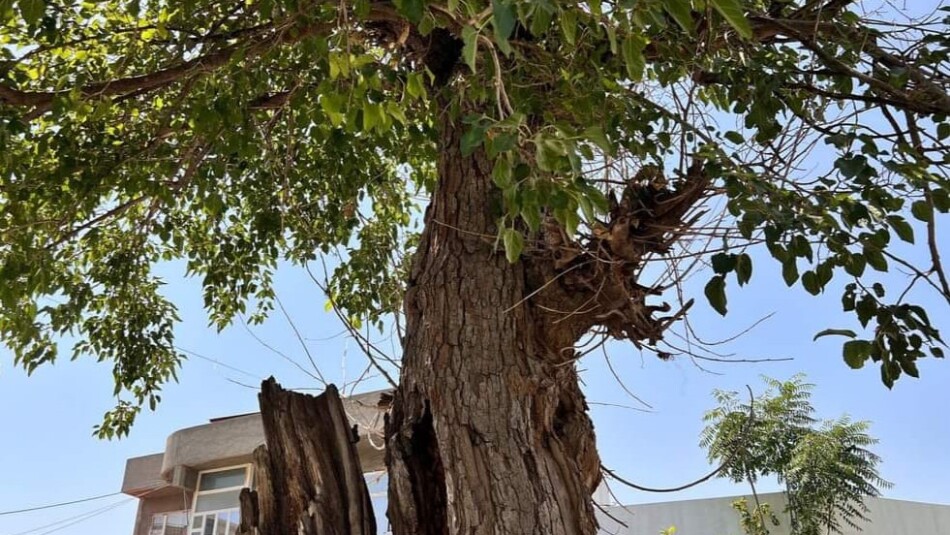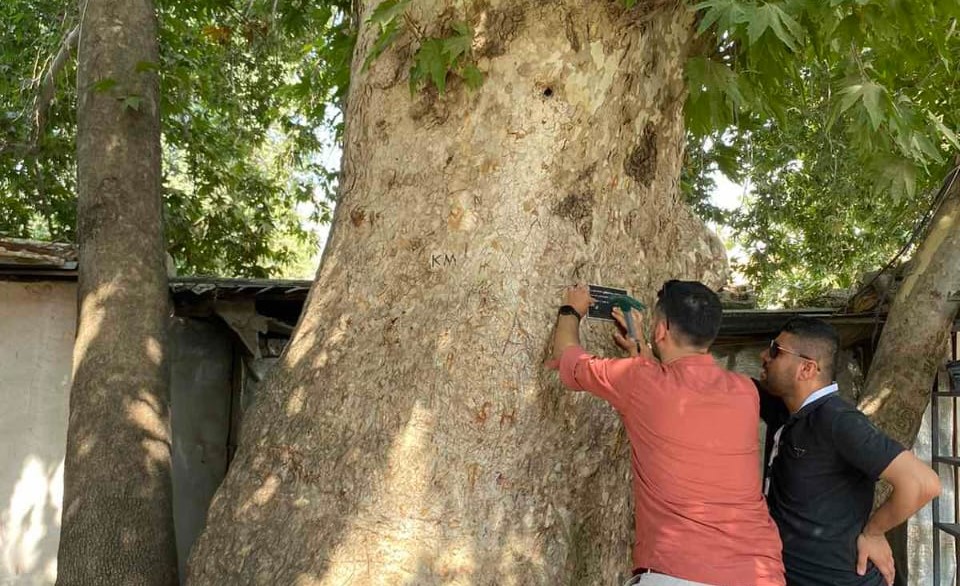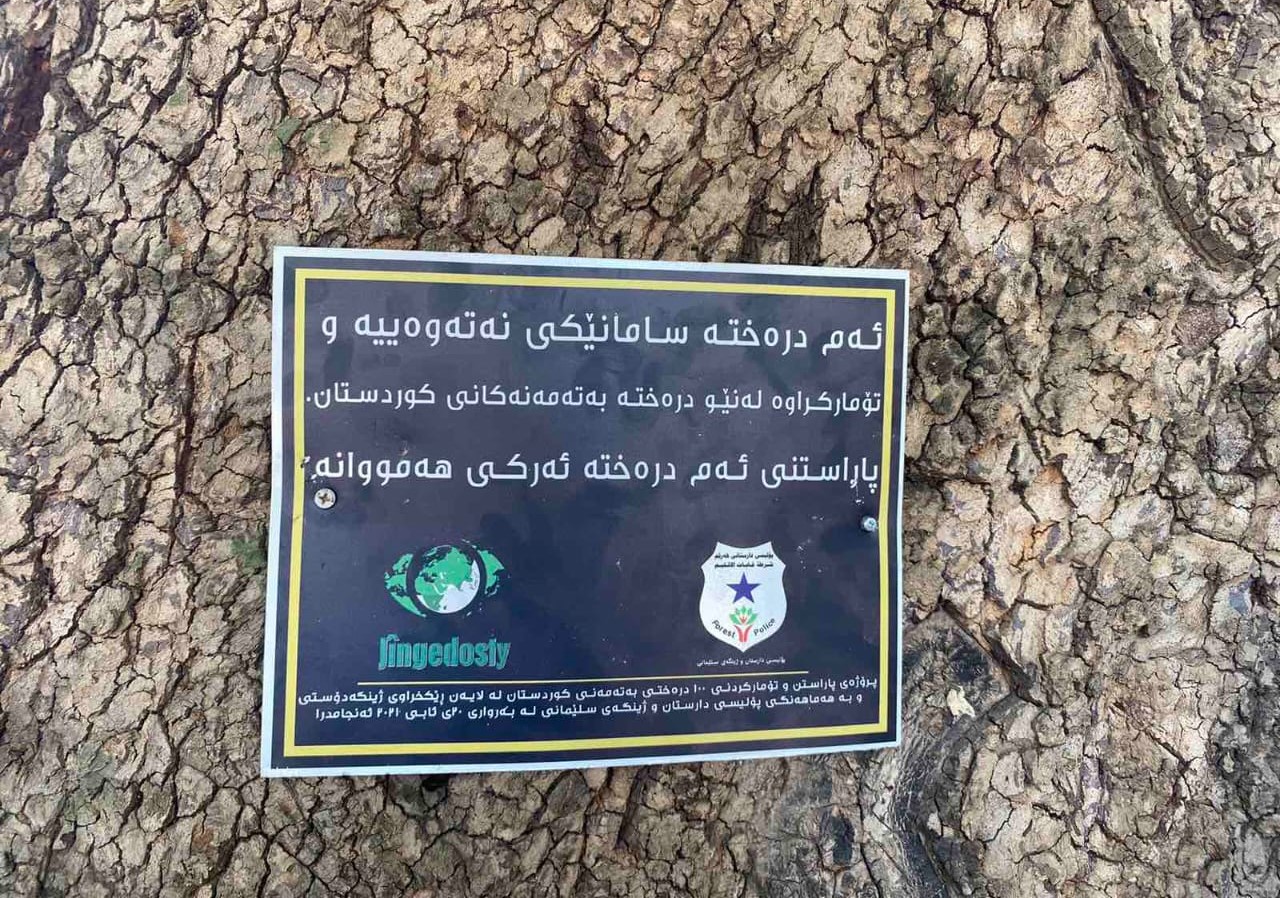
Hazhar Abdullah and his team travel from city to city in search of old trees, collect information about them and take care of protecting them, in return for the service these trees have provided to the environment as unknown soldiers.
Trees and green spaces are a priority for those interested in the environmental issue, and the United Nations always considers this an effective and influential way to confront the risks of climate change.
Abdullah's initiative serves nature and the environment by preserving trees that protect the city's air from pollution for a century or more. The project of registering 100 old trees is a first step followed by larger steps.
“The goal is to take care of green spaces and for citizens and relevant authorities to be aware and informed about increasing green spaces and protecting existing trees,” said Abdullah, the project manager, whose first phase was launched in August 2021 and the second in July 2024.
The project is proceeding at a relatively slow pace, because the nature of the task is not easy and requires a lot of research and inquiry. So far, 14 perennial trees have been registered in the northern provinces of Sulaymaniyah and Halabja.
Abdullah says that his team is seeking, within the framework of the project, to estimate perennial trees. “These trees have served the environment as unknown soldiers for a long time.”
The main and simple criterion for the project is to register every tree that is 100 years old or more, some of which are over 150 years old.
“Some perennial trees are located in populated areas, so they have been damaged and are in dire need of protection,” according to Abdullah.

A warning sign calls for the preservation of trees that are over 100 years old, Sulaymaniyah, 2024. Exclusively for (KirkukNow)
The project to protect and register perennial trees is supervised by an Environmental Organization, a local NGO, in coordination with the Sulaymaniyah Forest and Environment Police.
Abdullah pointed out that volunteer activity is an important part of the project's success, "This is a contemporary and environmental issue that receives attention in all countries. These trees become important landmarks for the region and attract tourists."
Any old tree, after being found, information about it collected and registered, is fenced in order to protect it, and warning signs are placed on it to emphasize the need to preserve it.
People who cut down trees are held accountable if they are a year old or more
Anwar Rashid, a resident of the Kosay Cham area in Sulaymaniyah, pointed out the presence of an old tree in the middle of the neighborhood street, and despite attempts to cut it down, it is still intact.
"This tree has a long history, we want to preserve it as a historical symbol of this neighborhood, if the residents of the neighborhood had not been keen on the importance of this tree, it would have been cut down or uprooted by now,” Rashi said.
“We preserved it and coordinated with the environmental organization to register and protect it," Anwar said.
According to the laws in force in the Kurdistan Region of Iraq KRI, the penalty for cutting down a tree starts from a fine of 150,000 Iraqi dinars IQD and reaches imprisonment for a period of not less than six months, but the penalty under Iraqi law starts from a fine of IQD25,000 and reaches imprisonment for a period of up to two years.

Awareness campaign to protect over 100 years old trees, Sulaimaniyah, 2024. KirkukNow
Forest Police Spokesman Hemin Kamrkhan told (KirkukNow), "People who cut down trees are held accountable if they are a year old or more," explaining that the violator is punished by paying a fine of five million IQD in addition to imprisonment and being obligated to plant another tree in place of the cut tree.
Trees play the role of air filters, as they purify the air from toxic gases, dust and smoke, in addition to their other environmental benefits, according to studies published by the United Nations UN.
The director of the aged trees registration project says that they intend to expand their activities to include all cities in the KRI.
Abdullah says that his team relies on several methods to register old trees, including historical accounts of specialists and residents of the area. "For example, there is a plane tree in the Khormal Grand Mosque in Halabja that is estimated to be between 500 and 600 years old, according to accounts."
Other activities of the project team include cleaning the surroundings of the trees and addressing the problems they face.
"We alone have a tree in the Awal neighborhood in Sulaymaniyah that was almost suffocating because it was covered with cement. We broke the cement, cleaned the soil of the tree, and carried out some scientific steps to revive it."
This is how Abdullah's team, which includes an agricultural expert, takes care of the trees.
The ages of trees vary according to their type and the environment in which they grow. There are trees in the world that live for several thousand years, according to the United Nations.
Finally, the Old Tree Registration Project publishes a booklet for public opinion that includes pictures, ages, and types of trees that have been registered.
This material has been produced as part of the program to expand the role of women in covering environmental issues. The program is implemented by KirkukNow Media Outlet and funded by the Federal Foreign Ministry of the Federal Republic of Germany.